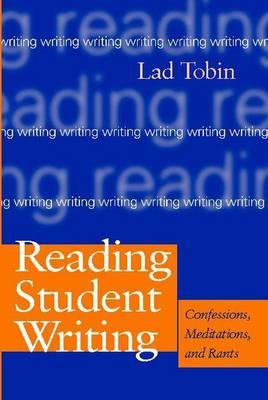Overview
Lad Tobin has a decidedly psychological take on life and a characteristically witty point of view on most subjects-especially his own writing and teaching. He also has a great deal of personal insight and story telling skill that make his books, articles, and presentations notable. In Reading Student Writing, he gets to the heart of teaching writing through a blend of humor, memoir, reflection, classroom examples, and student writing. While funny and irreverent, he tackles the serious and complex issues of how to read-really read-student writing and how to read ourselves as teachers. He organizes his book around three main topics: forms of student writing that we find particularly problematic the ways in which our values, assumptions, and unconscious associations shape our readings of student writing how our assessments of student writing are inseparable from our attitudes toward the discipline of composition as a whole. But this broad outline barely scratches the surface of what Tobin achieves in his execution. He fills his chapters with stories that read like the best creative nonfiction. And he doesn't hesitate to take on controversial topics, what he calls facing ""the elephant in the classroom,"" the issues we usually avoid-specifically reading and writing personal narratives, our love-hate relationship with emotion, our misplaced anxieties about confessional writing, and our struggles to be fair and unbiased readers. In the end, Tobin opens up the world of writing, both student writing and teacher scholarship. He invites us into a place that thrives on dialogue, diversity, and hybridity, that is more flexible, nuanced, and realistic. He sets an example for reading our classrooms, for writing-or rewriting-ourselves.
Full Product Details
Author: Tobin
Publisher: Heinemann USA
Imprint: Boynton/Cook Publishers Inc US
Dimensions:
Width: 15.50cm
, Height: 0.90cm
, Length: 23.00cm
Weight: 0.218kg
ISBN: 9780867095456
ISBN 10: 0867095458
Pages: 152
Publication Date: 12 March 2004
Audience:
College/higher education
,
Tertiary & Higher Education
Format: Hardback
Publisher's Status: Out of Print
Availability: In Print

Limited stock is available. It will be ordered for you and shipped pending supplier's limited stock.
Reviews
There is an exhilarating, go-for-broke quality in this book, a bravado or attitude that I don't think can be found in any other writing in the field. And I can think of no other scholar in Composition Studies who uses humor better than Tobin does, who cuts to the quick of an argument more effectively, who can so artistically both argue for and enact various forms of creative nonfiction. Reading Student Writing provides us with a valuable tool when we meet resistance, when we experience boredom and burnout, when our reaction to a student essay cannot be explained by rational and commonly accepted formalisms of composition assessment. -Thomas Newkirk, Author of The Performance of Self in Student Writing and Misreading Masculinity
-There is an exhilarating, go-for-broke quality in this book, a bravado or -attitude- that I don't think can be found in any other writing in the field. And I can think of no other scholar in Composition Studies who uses humor better than Tobin does, who cuts to the quick of an argument more effectively, who can so artistically both argue for and enact various forms of creative nonfiction. Reading Student Writing provides us with a valuable tool when we meet resistance, when we experience boredom and burnout, when our reaction to a student essay cannot be explained by rational and commonly accepted formalisms of composition assessment.--Thomas Newkirk, Author of The Performance of Self in Student Writing and Misreading Masculinity
?There is an exhilarating, go-for-broke quality in this book, a bravado or?-Thomas Newkirk, Author of The Performance of Self in Student Writing and Misreading Masculinity
Author Information
Lad Tobin is an assistant professor of English at Boston College where he directs the first-year Writing Program, trains graduate assistants, and teaches composition and composition theory. He is author of Writing Relationships: What Really Happens in the Composition Class (Boynton/Cook, 1991) and Taking Stock: The Writing Process Movement in the '90s (Boynton/Cook, 1994). His articles on the nature of interpersonal relationships in the writing class have appeared in College English, College Composition and Communication, To Compose (Heinemann, 1989), and Vital Signs 2 (Heinemann, 1991).




